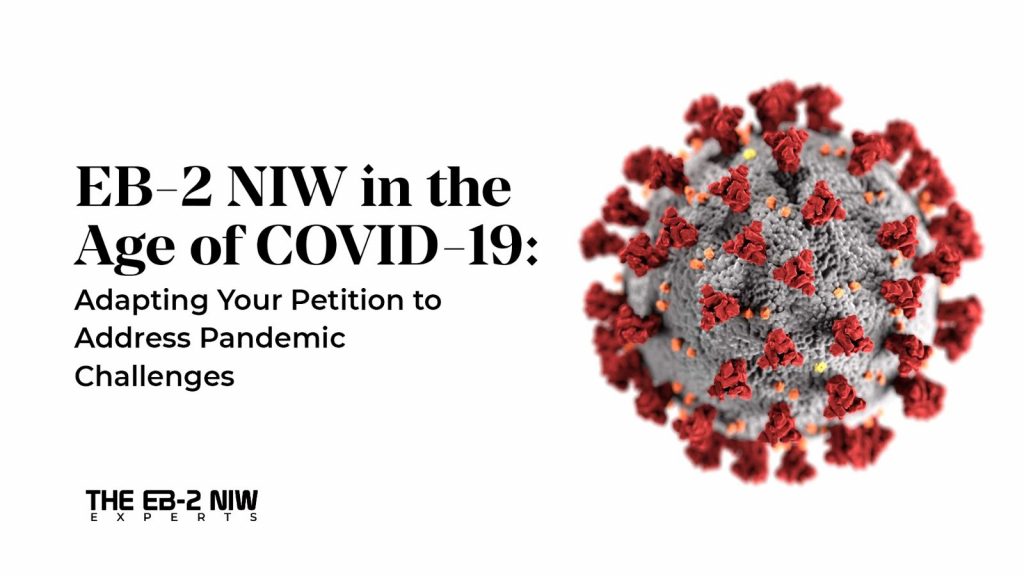The COVID-19 pandemic has brought unprecedented challenges to every aspect of life, including the U.S. immigration process. For those seeking an EB-2 National Interest Waiver (NIW), the pandemic has added new hurdles but also new opportunities to demonstrate the national importance of their work. This blog post provides strategies for navigating the EB-2 NIW process during the COVID-19 pandemic, helping you adapt your petition to address the unique challenges posed by this global crisis.
Understanding the EB-2 NIW Criteria
The EB-2 NIW visa category allows individuals with exceptional abilities or advanced degrees to self-petition for a green card by demonstrating that their work is in the national interest of the United States. The key criteria include:
- Exceptional Ability or Advanced Degree: The applicant must possess an advanced degree or exceptional ability in their field.
- National Interest: The applicant’s work must significantly benefit the U.S., justifying a waiver of the usual requirement for a job offer and labor certification.
Adapting Your EB-2 NIW Petition During COVID-19
The pandemic has reshaped many industries and created new areas of national interest. Here’s how to adapt your EB-2 NIW petition to address the current challenges:
1. Highlight Pandemic-Related Contributions
If your work directly relates to addressing the COVID-19 crisis, emphasize this in your petition. This could include:
- Healthcare and Medical Research: Contributions to COVID-19 treatment, vaccine development, or public health strategies.
- Technology and Innovation: Development of technologies that facilitate remote work, telehealth, or pandemic response.
- Economic Recovery: Initiatives that support economic resilience and recovery efforts.
Example: If you have developed a telehealth platform that has improved access to medical care during the pandemic, provide detailed evidence of its impact, including user statistics, health outcomes, and endorsements from healthcare providers.
2. Demonstrate Adaptability and Innovation
The pandemic has required many professionals to adapt and innovate. Showcase your ability to pivot and contribute effectively during this crisis.
- Adapting Business Models: Describe how you have modified your business or research to meet new demands.
- Innovative Solutions: Highlight any new products, services, or methods you have developed in response to COVID-19.
Example: An engineer who has repurposed manufacturing processes to produce personal protective equipment (PPE) should detail the scope and impact of this adaptation.
3. Emphasize Public and Economic Benefits
Articulate how your work benefits the public and supports economic stability, both critical areas during the pandemic.
- Public Health Impact: Explain how your work improves public health outcomes or healthcare infrastructure.
- Economic Contributions: Demonstrate how your work supports job creation, economic growth, or industry stability.
Example: A public health expert who has developed community outreach programs to increase vaccination rates should provide data on program success and community impact.
Strategies for Building a Strong Petition
1. Gather Comprehensive Evidence
Ensure your petition includes robust evidence of your achievements and their relevance to the national interest, especially in the context of COVID-19.
- Documentation: Collect articles, research papers, project reports, and media coverage that highlight your contributions.
- Letters of Recommendation: Obtain letters from industry experts, colleagues, and beneficiaries of your work, focusing on its significance during the pandemic.
2. Provide a Clear Narrative
Craft a compelling narrative that ties your work to the national interest, emphasizing its relevance and impact in the current context.
- Storytelling: Use storytelling to make your case more relatable and persuasive, linking your personal journey to your professional achievements.
- Impact Statements: Include detailed impact statements that quantify your contributions and their benefits.
3. Stay Updated on Policy Changes
Keep abreast of any changes in immigration policies and guidelines that may affect your petition. The pandemic has led to shifts in priority areas, which can influence how your petition is evaluated.
- USCIS Updates: Regularly check updates from the U.S. Citizenship and Immigration Services (USCIS) to stay informed about any new policies or procedures.
Conclusion
The COVID-19 pandemic has added complexity to the EB-2 NIW petition process but also created new opportunities to demonstrate the national importance of your work. By highlighting your pandemic-related contributions, demonstrating adaptability, and providing comprehensive evidence, you can strengthen your EB-2 NIW petition and increase your chances of success.
For expert guidance and assistance with EB-2 NIW petitions, visit EB2NIWExperts. For an initial evaluation of your eligibility and documentation requirements, click here. Stay updated on immigration news and updates from USCIS here.


